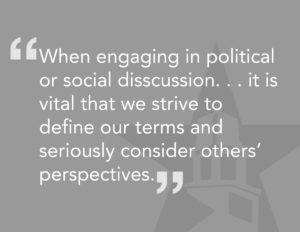When I look at the world around me, I am reminded of the social and political debates that consume America. Each time one of these topics is discussed—whether it be the unfair treatment of minorities, gender roles, or abortion rates—it seems that people are forced to take a binary stance on that topic. They must say either “Yes, that is a problem,” or “No, it isn’t an issue.” However, this dichotomy harms our ability to see nuance and divides Americans along political party lines. Disagreements like these, where one party is fully on board and the other is almost entirely antagonistic to the cause, can turn people against each other faster than any other situation I know.
 Examples of this polarization include our reactions to the conditions of majority black neighborhoods, the amount of gun violence in the United States, and the number of abortions per year in the United States. These are all things which the average person should say “yes, that is a problem.” Then why is it that, when engaging in discussion or disagreement, there is usually one individual who claims that the problem is entirely nonexistent? Hardly ever do we agree on one real problem and discuss solutions.
Examples of this polarization include our reactions to the conditions of majority black neighborhoods, the amount of gun violence in the United States, and the number of abortions per year in the United States. These are all things which the average person should say “yes, that is a problem.” Then why is it that, when engaging in discussion or disagreement, there is usually one individual who claims that the problem is entirely nonexistent? Hardly ever do we agree on one real problem and discuss solutions.
Our leaders do the same thing and it’s almost like we are imitating them, like little kids pretend to be their parents. Whenever one side presents an issue, the other side makes it their responsibility to dismiss the concerns raised. Even if it is something that is conservative and cultural in nature, if the Democrats bring it up, it is always wrong to a Republican. Even if a cause fundamentally pushes for the rights of humankind, if it is brought up by a conservative, the liberal population will tear it apart. Strictly liberal or conservative solutions to problems don’t exist, and we need to stop pretending that they do. If we are going to function under our bipartisan system, we should focus on appropriate solutions, not on what problems deserve to be considered problems. America would look at a lot more hopeful if people like Bernie Sanders or Paul Ryan didn’t go on Twitter and immediately start tearing apart the other side. For instance, when the government shut down last week, both Democrats and Republicans took to social media to blame the other side rather than actually attempting to work things out.
 Our culture’s major problems need to be defined broadly, because what we might consider an appropriate solution to a problem is often influenced by what we perceive as the root cause. For instance, “liberal” and “conservative” solutions to America’s gun violence issue stem from different understandings of this issue’s cause. For more liberal individuals, the solution is stricter gun laws because the left’s view of the problem is related to individuals’ ability to obtain guns. On the other hand, the right’s solution to the problem involves greater emphasis on mental health concerns because to most conservative individuals, that is the primary cause of mass shootings.
Our culture’s major problems need to be defined broadly, because what we might consider an appropriate solution to a problem is often influenced by what we perceive as the root cause. For instance, “liberal” and “conservative” solutions to America’s gun violence issue stem from different understandings of this issue’s cause. For more liberal individuals, the solution is stricter gun laws because the left’s view of the problem is related to individuals’ ability to obtain guns. On the other hand, the right’s solution to the problem involves greater emphasis on mental health concerns because to most conservative individuals, that is the primary cause of mass shootings.
When engaging in political or social discussion, which is healthy and important, it is vital that we strive to define our terms and seriously consider others’ perspectives. This means looking at the concerns of people who we disagree with politically rather than dismissing their priorities out of hand. It is much more likely that we will have a productive conversation when we focus on solutions rather than problems. Only then can the appropriate path for change be revealed. Though no problems will directly be solved by doing this, we will view those we are debating more seriously, their concerns will be easier to understand, and working towards solving a problem will be much more civilized.
Devin is a sophomore majoring in English and writing.
